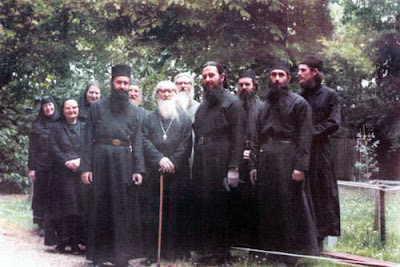Parmi les choses ayant appartenu au bienheureux Serafim (de Sarov), les sœurs, qui étaient expulsées du Monastère de Diveïevo en 1927, conservaient soigneusement dans un précieux coffre un petit cierge: Quand "Mère Frossia" sortait ces reliques afin que les pèlerins puissent les vénérer, le cierge était d'ordinaire à part, personne ne le remarquait. Un jour, je lui demandai ce qu'il avait de singulier. Et elle me raconta son histoire.
Le cierge datait de l'époque de "Saint Serafim". Il l'avait offert aux moniales juste avant de mourir en leur disant: "L'une d'entre vous ira en tenant ce cierge à la rencontre de mon corps quand il sera transporté et inhumé à Diveïevo. Car ma dépouille ne restera pas à Sarov, je viendrai vous retrouver à Diveïevo."
















































